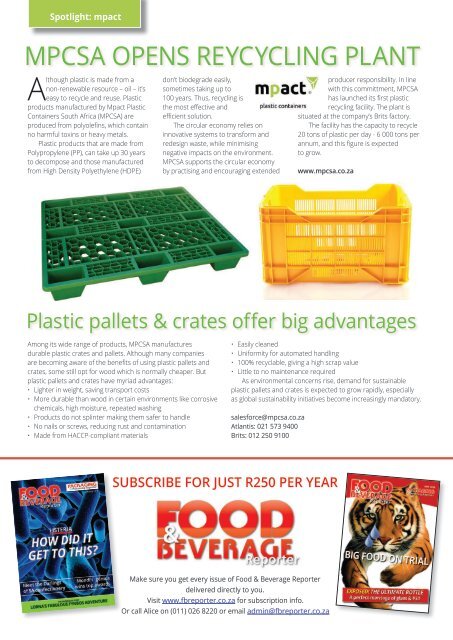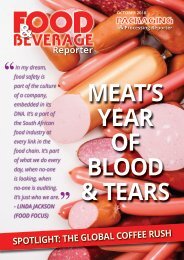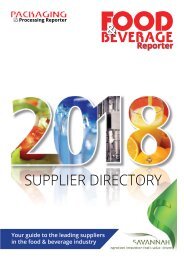Food & Beverage Reporter August 2018
South Africa's leading B2B magazine for the food & beverage sector and its allied industries in processing/packaging etc
South Africa's leading B2B magazine for the food & beverage sector and its allied industries in processing/packaging etc
Create successful ePaper yourself
Turn your PDF publications into a flip-book with our unique Google optimized e-Paper software.
Spotlight: mpact<br />
MPCSA OPENS REYCYCLING PLANT<br />
Although plastic is made from a<br />
non-renewable resource – oil – it’s<br />
easy to recycle and reuse. Plastic<br />
products manufactured by Mpact Plastic<br />
Containers South Africa (MPCSA) are<br />
produced from polyolefins, which contain<br />
no harmful toxins or heavy metals.<br />
Plastic products that are made from<br />
Polypropylene (PP), can take up 30 years<br />
to decompose and those manufactured<br />
from High Density Polyethylene (HDPE)<br />
don’t biodegrade easily,<br />
sometimes taking up to<br />
100 years. Thus, recycling is<br />
the most effective and<br />
efficient solution.<br />
The circular economy relies on<br />
innovative systems to transform and<br />
redesign waste, while minimising<br />
negative impacts on the environment.<br />
MPCSA supports the circular economy<br />
by practising and encouraging extended<br />
producer responsibility. In line<br />
with this committment, MPCSA<br />
has launched its first plastic<br />
recycling facility. The plant is<br />
situated at the company’s Brits factory.<br />
The facility has the capacity to recycle<br />
20 tons of plastic per day - 6 000 tons per<br />
annum, and this figure is expected<br />
to grow.<br />
www.mpcsa.co.za<br />
Plastic pallets & crates offer big advantages<br />
Among its wide range of products, MPCSA manufactures<br />
durable plastic crates and pallets. Although many companies<br />
are becoming aware of the benefits of using plastic pallets and<br />
crates, some still opt for wood which is normally cheaper. But<br />
plastic pallets and crates have myriad advantages:<br />
• Lighter in weight, saving transport costs<br />
• More durable than wood in certain environments like corrosive<br />
chemicals, high moisture, repeated washing<br />
• Products do not splinter making them safer to handle<br />
• No nails or screws, reducing rust and contamination<br />
• Made from HACCP-compliant materials<br />
• Easily cleaned<br />
• Uniformity for automated handling<br />
• 100% recyclable, giving a high scrap value<br />
• Little to no maintenance required<br />
As environmental concerns rise, demand for sustainable<br />
plastic pallets and crates is expected to grow rapidly, especially<br />
as global sustainability initiatives become increasingly mandatory.<br />
salesforce@mpcsa.co.za<br />
Atlantis: 021 573 9400<br />
Brits: 012 250 9100<br />
SUBSCRIBE FOR JUST R250 PER YEAR<br />
Make sure you get every issue of <strong>Food</strong> & <strong>Beverage</strong> <strong>Reporter</strong><br />
delivered directly to you.<br />
Visit www.fbreporter.co.za for subscription info.<br />
Or call Alice on (011) 026 8220 or email admin@fbreporter.co.za







